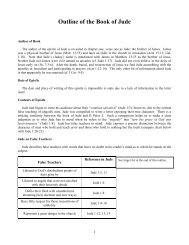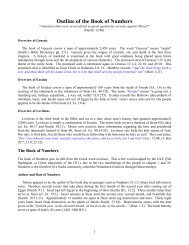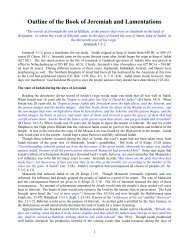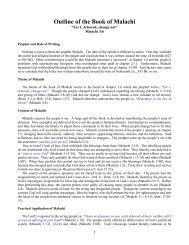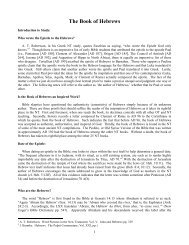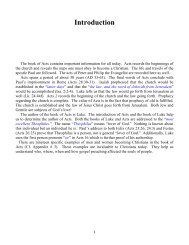Outline of the Book of I Timothy - The Floral Heights Church of Christ
Outline of the Book of I Timothy - The Floral Heights Church of Christ
Outline of the Book of I Timothy - The Floral Heights Church of Christ
Create successful ePaper yourself
Turn your PDF publications into a flip-book with our unique Google optimized e-Paper software.
God writes, "A son honors his fa<strong>the</strong>r, and a servant his master: if <strong>the</strong>n I am a fa<strong>the</strong>r, where is<br />
mine honor? And if I am a master, where is my fear? Saith Jehovah <strong>of</strong> hosts unto you, O priests,<br />
that despise my name. And ye say, Wherein have we despised thy name?" (Malachi 1:6).<br />
VI. Paul gives <strong>Timothy</strong>, <strong>the</strong> evangelist, a message to give to Rich <strong>Christ</strong>ians (6:17-19):<br />
A. "Charge <strong>the</strong>m that are rich in this present world, that <strong>the</strong>y be not highminded, nor have <strong>the</strong>ir hope set<br />
on <strong>the</strong> uncertainty <strong>of</strong> riches, but on God, who gives us richly all things to enjoy;" (6:17).<br />
1. Once again we find <strong>the</strong> word "charge" which, as discussed at I <strong>Timothy</strong> 1:17 and 6:13, means to<br />
command someone to do something. Obviously <strong>the</strong>re were <strong>Christ</strong>ians during Paul's days who were<br />
actually wealthy. <strong>The</strong>ir wealth did not make <strong>the</strong>m sinners but <strong>the</strong>ir approach to <strong>the</strong>ir wealth had<br />
<strong>the</strong> potential <strong>of</strong> making <strong>the</strong>m sinners.<br />
2. Note that <strong>the</strong> Apostle Paul does not tell <strong>the</strong> wealthy <strong>Christ</strong>ians to sell everything <strong>the</strong>y have and give<br />
to <strong>the</strong> poor as Jesus told <strong>the</strong> rich young ruler (see Matt. 19:21). Paul tells <strong>Timothy</strong> to command<br />
that those <strong>Christ</strong>ians who are rich to do two things (see study # 40; Riches and Wealth):<br />
a. First, <strong>the</strong> rich <strong>Christ</strong>ians were not to be "highminded" (hupselopsronein) = "to have l<strong>of</strong>ty<br />
thoughts, be proud, overweening (presumptuously arrogant), haughty (see also Rom. 11:20)"<br />
(Moulton 421). Sometimes when we are around <strong>the</strong> wealthy it is apparent by <strong>the</strong>ir attitudes<br />
that <strong>the</strong>y believe that <strong>the</strong>y are at a different financial level than o<strong>the</strong>rs and <strong>the</strong>reby o<strong>the</strong>rs who<br />
are not at <strong>the</strong>ir level are not worth <strong>the</strong>ir time or attention.<br />
b. Secondly, rich <strong>Christ</strong>ians were not to set <strong>the</strong>ir "hope in <strong>the</strong>ir riches" because, as Paul said<br />
earlier, no man will take any accumulated wealth with him when he dies (see I Tim. 6:7). <strong>The</strong><br />
<strong>Christ</strong>ian's hope ought to be on God.<br />
B. "that <strong>the</strong>y do good, that <strong>the</strong>y be rich in good works, that <strong>the</strong>y be ready to distribute, willing to<br />
communicate; laying up in store for <strong>the</strong>mselves a good foundation against <strong>the</strong> time to come, that <strong>the</strong>y<br />
may lay hold on <strong>the</strong> life which is life indeed" (6:18-19).<br />
1. <strong>The</strong> third thing Paul tells <strong>Timothy</strong> to command <strong>the</strong> rich to do is to do good and be rich in good<br />
works in relation to distributing and "communicating" to those less fortunate or in various needs.<br />
<strong>The</strong> <strong>Christ</strong>ian should not hoard his riches but ra<strong>the</strong>r have a willing disposition to help o<strong>the</strong>rs in<br />
need.<br />
2. When <strong>the</strong> wealthy <strong>Christ</strong>ian is willing to help o<strong>the</strong>rs he or she lays up treasures in heaven where<br />
true life (eternal life) will be experienced.<br />
VII. Final Benediction and Admonition to <strong>Timothy</strong> (6:20-21):<br />
A. "O <strong>Timothy</strong>, guard that which is committed unto <strong>the</strong>e, turning away from <strong>the</strong> pr<strong>of</strong>ane babblings and<br />
oppositions <strong>of</strong> <strong>the</strong> knowledge which is falsely so called" (6:20).<br />
1. First <strong>Timothy</strong> has been an epistle that outlines <strong>the</strong> duties <strong>of</strong> <strong>the</strong> evangelist and <strong>the</strong> <strong>Christ</strong>ian's<br />
approach to this life. Above all things man must keep <strong>the</strong> doctrine <strong>of</strong> Jesus <strong>Christ</strong> in all its purity<br />
ra<strong>the</strong>r than allowing o<strong>the</strong>rs to pervert it. Paul <strong>the</strong>reby pleads with <strong>Timothy</strong> to "guard" <strong>the</strong> faith.<br />
<strong>The</strong> word "guard" (psulazon) = "watch, guardian, keeper, protector" (LS 874). <strong>The</strong>re were<br />
obviously men who were teaching false doctrines (see I Tim. 1:3; 6:3), involving <strong>the</strong>mselves in<br />
fables and genealogies (I Tim. 1:4), and participating in "pr<strong>of</strong>ane babblings" (kenopsonias) =<br />
"Empty discussion, discussion <strong>of</strong> vain and useless matters” (Thayer 2757). <strong>Timothy</strong> was also to<br />
turn away from "oppositions" (anti<strong>the</strong>sis) “that which is opposed: <strong>the</strong> inventions <strong>of</strong> false<br />
knowledge, ei<strong>the</strong>r mutually oppugn ant, or opposed to true <strong>Christ</strong>ian doctrine” (Thayer 50). As<br />
Ezekiel is commanded <strong>of</strong> God to be a watchman over Israel (Ezek. 3:16ff) so God now commands<br />
evangelists (I Tim. 6:20) and members <strong>of</strong> <strong>the</strong> body <strong>of</strong> <strong>Christ</strong> (Rom. 16:17) to do no less<br />
(see study # 28).<br />
2. Knowledge (gnosis) “<strong>of</strong> <strong>the</strong> heretical Gnosis (Gnosticism): <strong>of</strong> knowledge falsely so called” (AG<br />
164). “Gnosticism was a heresy far more subtle and dangerous than any that had appeared during<br />
<strong>the</strong> early years <strong>of</strong> <strong>the</strong> church. It became so widespread that by <strong>the</strong> beginning <strong>of</strong> <strong>the</strong> 3 rd century<br />
A.D. most <strong>of</strong> <strong>the</strong> intellectual <strong>Christ</strong>ian congregations throughout <strong>the</strong> Roman Empire were to some<br />
degree infected by it… <strong>The</strong> fantastic product <strong>of</strong> <strong>the</strong> blending <strong>of</strong> certain <strong>Christ</strong>ian ideas with<br />
speculations and imaginings derived from a medley <strong>of</strong> sources (Greek, Jewish, Parsic;<br />
philosophies, religions, <strong>the</strong>osophies, mysteries) in a period when <strong>the</strong> human mind was in a kind <strong>of</strong><br />
ferment…Neander, a Greek philosopher <strong>of</strong> <strong>the</strong> 2 nd cent., described Gnosticism as “<strong>the</strong> first notable<br />
45



